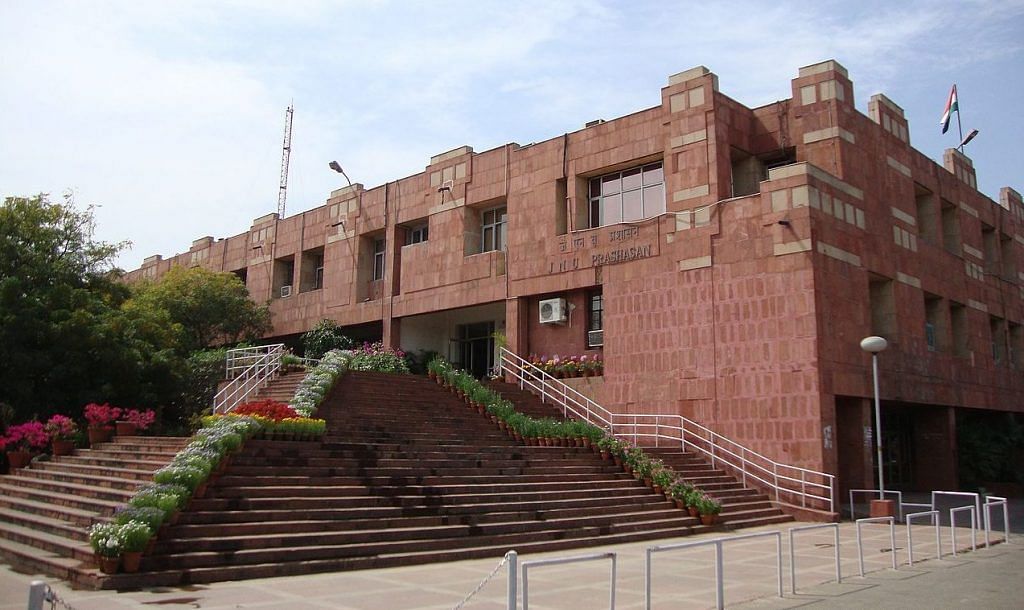New Delhi: Students at the Jawaharlal Nehru University (JNU) have allegedly been on edge since the authorities replaced the private security guards on campus with former Army men drawn from an organisation involved in veteran welfare.
The university has, however, clarified that there is no hidden message in the induction of 270 former soldiers to guard the campus.
The former Army personnel took position on campus last month, and will perform a role that was earlier entrusted to 500 private security guards. The latter, many of whom had worked at JNU for nearly 10 years, were verbally asked to leave work on 18 September.
Speaking to ThePrint, the university said the move was only a routine change of guards. According to JNU registrar Pramod Kumar, they tapped the Army Welfare Placement Organisation (AWPO) for security after the university’s contract with a private security firm expired and tenders failed to yield another contractor.
The AWPO is a welfare organisation of the Indian Army that was established in 1999 to assist retiring or retired personnel in getting suitable jobs. It is common for private firms to hire retired Army personnel as security guards because they are already trained in crowd control and reacting to emergency situations. “We decided to hire former service personnel as security guards after the contract with the last company expired,” Kumar said.
Students at JNU, one of India’s premier educational institutes known for a robust culture of free speech, however, fear that this could be an attempt to curb dissent and demonstrations.
JNU is known as a bastion of the Left and has often found itself in the crosshairs of the ruling dispensation, especially since the 2016 protest where students allegedly raised “anti-India” slogans.
“The hiring happened in a very secretive manner… The administration knows that there is some kind of solidarity among workers, guards and the students, which is what the administration does not like,” said Aishe Ghosh, president of the JNU Students’ Union (JNUSU). “It thinks that a guard’s job is only to beat people up and restrict voices.”
Ghosh also questioned why the security force for the campus had suddenly been halved. “A smaller number of guards… means a lot of places such as hostels and libraries will be left unmanned,” she added.
Also read: JNU won’t discontinue Professor Emeritus status of any academician, says HRD ministry
‘Don’t know if service personnel will fit in’
Saloni Pandey, another JNU student, said she was apprehensive about how the former service personnel will fit into the university environment. “We have spoken to some of the guards and they told us that this was their first posting in a set-up like this. It will take time for them and us to get used to this arrangement,” she said.
Meanwhile, labour rights activists have expressed fears that JNU may similarly replace other contractural employees, while reiterating the students’ concerns about bringing in former soldiers.
“There is no study to prove that former service personnel have proven to be good security guards. We fear the university has got them so that they can instil more fear in the minds of students and restrict protests,” said Abhishek Singh, general secretary of All India Central Council of Trade Unions (AICCTU), who has helped the former security guards file a petition in the Delhi High Court against their dismissal.
Singh, a JNU alumnus, added, “Replacing people has never happened in JNU. Contracts have ended but people remain the same. With this move, the university seems to have started a new trend and we fear it will lead to more job losses.”
Also read: Is JNU enforcing age ban on profs emeriti? Modi critic Thapar asked for details of work
Reinstated guards don’t do ‘actual work’
The security guards whose services were terminated approached the Delhi High Court in September, following which JNU was asked to reinstate 11 of them. But according to Gunjan Singh, the lawyer representing the guards, those brought back have only been employed as a “formality”.
“They only sign the register and not do any actual work. It seems that the university administration is doing this so that they can sack them again, citing no work,” said Singh.
According to their petition, a copy of which is with ThePrint, 500 security guards who had been employed in the university for the past 5 to 10 years were not even given a termination letter by the university administration and only “told” to stop coming to work.
Also read: JNU became ‘badnaam like Munni’ says ABVP leader, BJP MP says rename it after Modi
